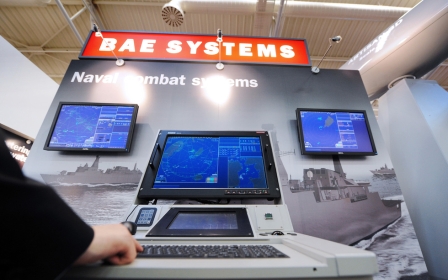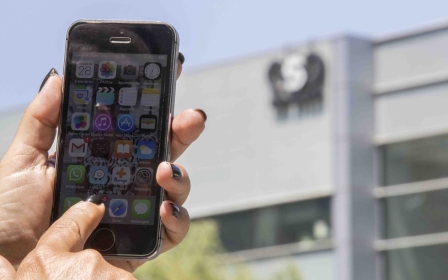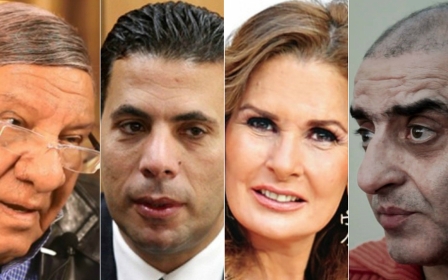EXCLUSIVE: UK approves $42m in spyware sales to Middle East 'regimes'

LONDON - Britain has approved the export of more than $40m of surveillance equipment to the Middle East since 2015, prompting fears it is being used to track political dissidents and activists, Middle East Eye can reveal.
The figures show millions of dollars of exports were approved to Gulf states who are criticised by rights campaigners of spying on and repressing dissidents and opposition leaders.
Saudi Arabia, whose crown prince Mohammed bin Salman started a three-day visit to London on Wednesday, bought $818,000 of equipment, while Kuwait bought $2.8m. Bahrain, the UAE and Qatar were also sold surveillance equipment.
UK spy sales 2015-2017
UAE .... $23.5m
Israel .... $6.5m
Turkey .... $3.4m
Oman .... $2.8m
Kuwait .... $2.8m
Iraq .... $1m
Saudi Arabia .... $818,000
Qatar .... $720,731
Egypt .... $664,298
Bahrain .... $544,452
Lebanon .... $322,770
Tunisia .... $251,625
Algeria .... $225,000
Morocco .... $207,843
UAE however was by far the largest single customer, buying $23.5m of spy equipment in that period. It was followed by Israel at $6.5m.
A coalition of UK human rights groups are planning to protest against bin Salman's visit outside Downing Street on Tuesday evening, calling out rights abuses in the kingdom. They accuse the crown prince of using a "modernising agenda" which has seen women given the right to drive cars, as a cover to crack down on dissent.
Campaigners will protest the Yemen war but also the use of counter-terrorism laws to prosecute human rights activists in Saudi Arabia.
According to Amnesty UK the laws have been used to bring "vague and overly-broad charges for their peaceful activism", while the "notorious" Specialised Criminal Court has used terrorism laws to sentence human rights activists for up to 15 years in prison in "flagrantly unfair trials".
In total the UK has approved $42,776,315 in spy equipment exports to the Middle East since 2015, amid fears from campaigners that the surveillance equipment is allowing "repressive regimes" to crush dissent.
The figures also show millions of dollars of exports to Algeria, Iraq, Lebanon, Morocco, Oman and Tunisia.
The vast majority of export licences are for "software for telecommunications interception equipment" or telecommunications interception equipment.
Repression
The sales of spy equipment to countries where there is a clear risk of internal repression is prohibited by the 2008 British Export Controls Act, but the new figures show the government has sanctioned the sale of spyware to Saudi Arabia, Bahrain, Turkey and Egypt, despite evidence of surveillance technology being used to target activists and opponents.
The surveillance equipment ranges from software to access emails and phone records to kit to turn smartphones into covert microphones.
Included in UK exports are devices known as "IMSI catchers" that can masquerade as normal mobile phone masts but are actually used to identify phone users and direct malware - software used to allow its operator to covertly control a target's handset.
It was once the preserve of US and European intelligence services, but now is affordable on the global security market.
The figures have come to light as security experts gather at the UK government official security event in Farnborough this week. Saudi officials are attending the Security and Policing Event this week, which has been described by opponents as a "government-sponsored annual surveillance week".
Andrew Smith, a spokesman for the Campaign Against Arms Trade, which compiled the figures, told MEE: "It is not just conventional weapons that can be used for oppression, it is also surveillance equipment. It is totally irresponsible for the government to be promoting and selling phone-tapping equipment to regimes that have a record of cracking down on dissent.
"Events like Security and Policing only strengthen the UK's ties to dictatorships and entrench the government's role as a global arms dealer. They undermine the UK's claims to be promoting human rights and strengthen the position of repressive regimes."
Lloyd Russell-Moyle, a Labour MP who sits on the influential arms export controls select committee (CAEC), said: "With the notable exception of people suspected of terrorism offences, Britons, while subject to blanket state eavesdropping, are safe from arbitrary arrest, torture or extrajudicial execution. The same cannot be said for the citizens of dozens of states to which Britain is approving sales of spy equipment.
"The surveillance licences to Egypt are particularly concerning. Its military junta has removed legal impediments allowing it to lock up people indefinitely and without trial. Tens of thousands of political prisoners remain in black sites where torture is routine and endemic. Egypt's leader has said it is treasonous to criticise the nation's security services."
Spying on citizens
Last year, the BBC revealed that BAE Systems, the UK’s largest arms exporter, secretly sold mass surveillance technology to six Middle East states that have been criticised for repressing their citizens.
The software was used to spy on huge numbers of mobiles phones and emails, triggering claims from rights groups that the government of Saudi Arabia, UAE, Oman Qatar, Algeria and Morocco were using spy equipment to silence dissent.
International Trade Secretary Liam Fox, responsible for arms and security export licensing, has previously said his department has "robust" rules and takes regulating spy equipment "seriously", but has been accused of complicity in state-sponsored violence and repression.
A spokesperson for the Department for International Trade said: “The UK government takes its export control responsibilities very seriously and operates one of the most robust export control regimes in the world. We rigorously examine every application on a case-by-case basis against the Consolidated EU and National Arms Export Licensing Criteria, with risks around human rights abuses being a key part of our licensing assessment.
“We will not grant a licence if doing so would be inconsistent with these criteria and have suspended or revoked licences when the level of risk changes.”
New MEE newsletter: Jerusalem Dispatch
Sign up to get the latest insights and analysis on Israel-Palestine, alongside Turkey Unpacked and other MEE newsletters
Middle East Eye delivers independent and unrivalled coverage and analysis of the Middle East, North Africa and beyond. To learn more about republishing this content and the associated fees, please fill out this form. More about MEE can be found here.




